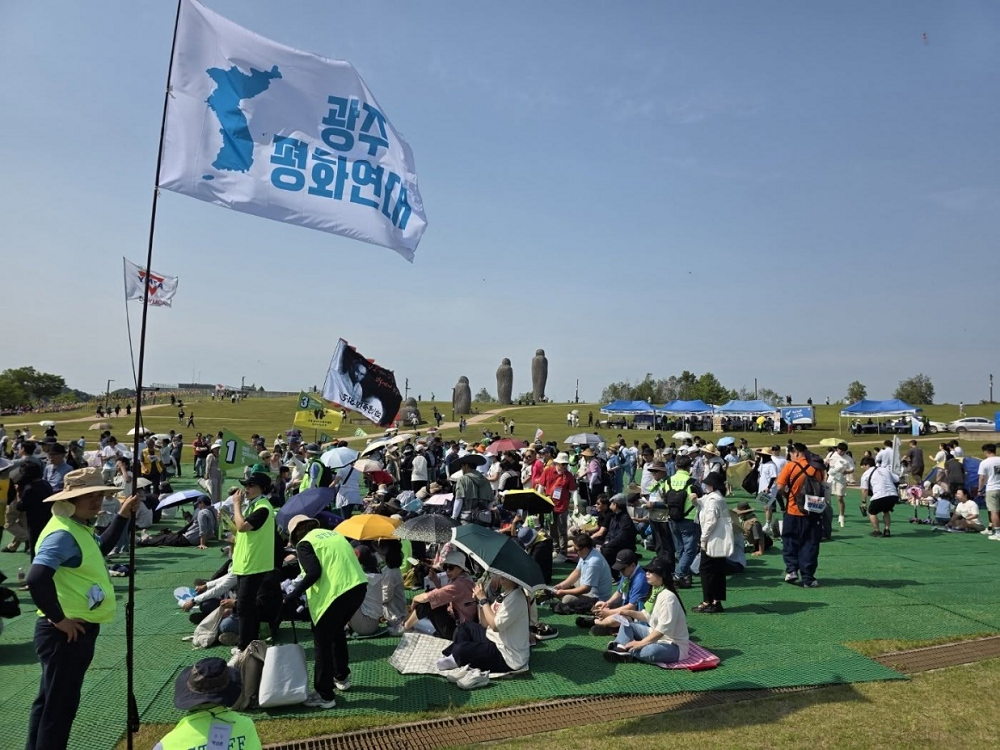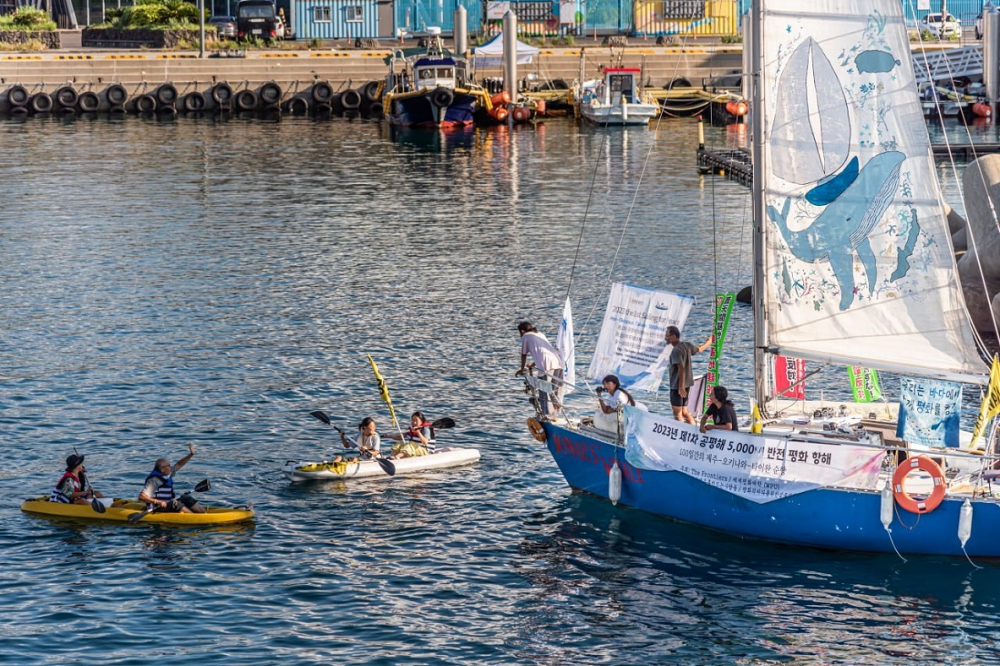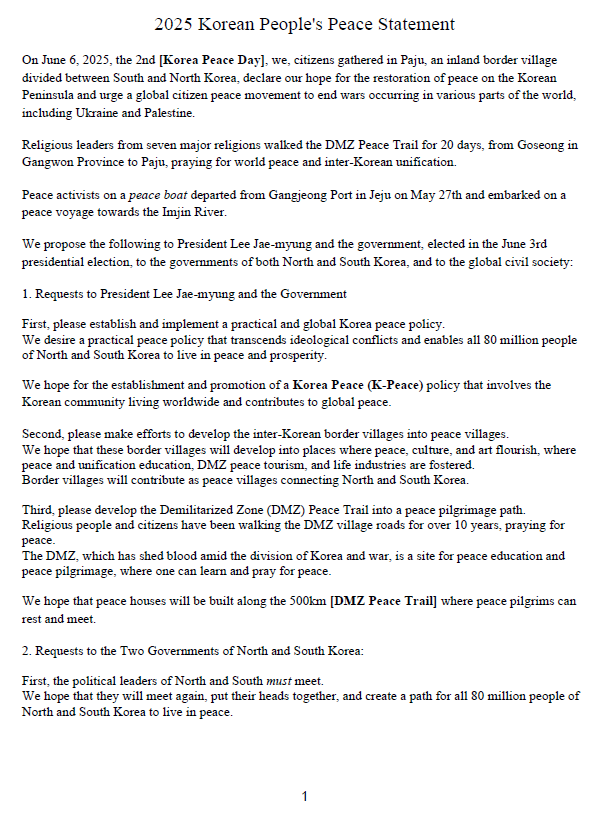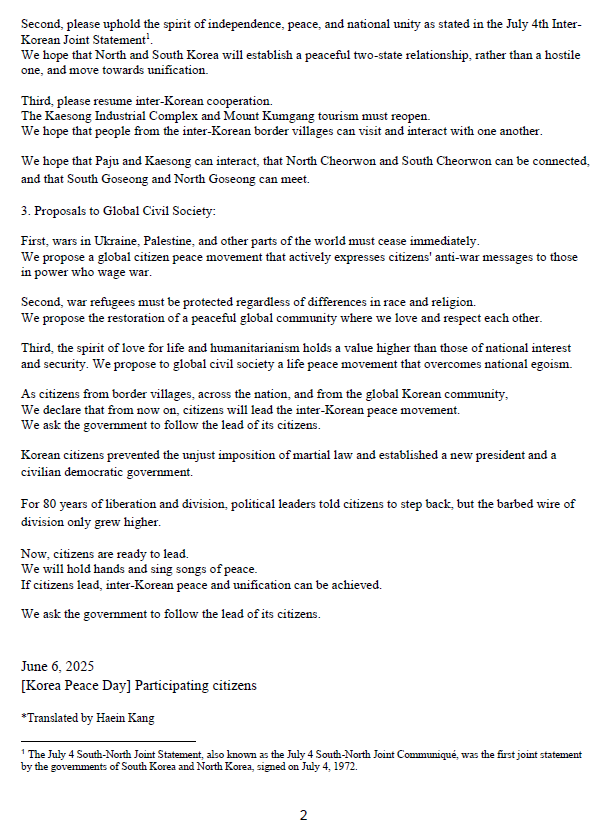Justice and Peace
2nd Korea Peace Day - Sing for Peace: End Hostility, Build Peace
Last Updated (Monday, 30 June 2025 13:34)
2nd Korea Peace Day - Sing for Peace: End Hostility, Build Peace
On June 6, 2025, more than 3,200 citizens gathered at Imjingak in Paju, South Korea, near the Demilitarized Zone (DMZ), to participate in the 2nd Korea Peace Day. Marking the 80th year since Korea’s liberation and division, the event brought together people across Korea─including the representatives from religious communities, artists, youth, and civil society─under the slogan: “Sing for Peace: End Hostility, Build Peace”.
Joining in solidarity for Just World, GS Nam Boo Won and Yura Rhee from Asia Pacific YMCA -APAY also attended the event, showing the support for citizen-led peace initiatives on the Korean Peninsula. It was meaningful to highlight the shared hope for peace not only within Korea but across the wider Asia-Pacific region.
Singing for Peace
At the heart of the event was a large-scale peace concert featuring choirs, traditional music groups, and youth orchestras from across Korea. Among the performers were choir and orchestra from local YMCAs. The concert culminated in a powerful moment when citizens held hands to form a symbolic human chain for peace, followed by the public declaration of a shared vision for peaceful inter-Korean reconciliation
One standout performance was the youth-led “Reaching Peace” busking show, performed by young musicians, singers, and rappers from both South and North Korean backgrounds. Nearly 500 people enjoyed this show, amplifying the youth’s heartfelt messages of hope and unity.
Peace Pilgrimage by Land and Sea
In the two weeks leading up to the Peace Day, two peace pilgrimages set out from the opposite corners of South Korea with the goal of converging at Imjingak on June 6.
The land pilgrimage, covering 385 kilometers along the DMZ, began in Goseong and included religious leaders from Christianity, Buddhism, Confucianism, and Korea’s native faith traditions. Their walk symbolized a journey of healing and solidarity.
Meanwhile, a sea pilgrimage departed from Jeju Island─the southernmost point of Korea─on a 700-kilomemter sailing voyage aboard the non-motorized yacht Jonah Wale. Despite severe wind conditions, mechanical issues, and even an entanglement with a fishing net that led to a ship change, the crew persisted on the peace sailing pilgrimage. Their arrival for the Peace Day celebrations was a powerful testament to resilience and dedication to peace.
The release of Peace Statement
The 2025 Korean People’s Peace Statement was released from this event and the essence is as follows:
- We, citizens gathered in Paju, called upon President Lee Jae-myung for pragmatic peace policies for the peaceful lives of 80 million Koreans, North and South.
- We urged the leaders of both Koreas to meet unconditionally.
- We requested the UN, international organizations, and global civil society to take action to end the wars in Palestine and Ukraine.
(See the full statement at the bottom)
Building a Culture of Peace for Citizen-Led Future
This year’s event built on the legacy of citizen-led peace movements, including the inaugural Korea Peace Day in Cheorwon in 2024, and earlier efforts such as the “DMZ Holding Hands: Spring Picnic to the DMZ” in April 2017. That event, which had approximately 200,000 citizens joining hands across DMZ bordering cities to advocate for peaceful reunification, was put on hold during the Covid-19 pandemic but re-emerged as Korea Peace Day.
Organized by the Border Peace School and other grassroots networks, the initiative seeks to create engaging peace culture rooted in citizen participation, especially in DMZ-adjacent regions. The next Korea Peace Day will be held in Yeoncheon in 2026, envisioning over 100,000 participants.
By Yura Rhee, Junior Executive Secretary, APAY
 |  |
 |  |


The Human-Made Famine Catastrophe Unfolding in Gaza and South Sudan
The Human-Made Famine Catastrophe Unfolding in Gaza and South Sudan
World Hunger Day was observed on May 28 to raise awareness about global food insecurity and encourage action to end hunger. This year's theme is "Sowing Resilience", focusing on how combating climate change can help ensure food security for all.
For three months, the world has watched a heartbreaking humanitarian crisis unfold in Gaza. Millions of vulnerable individuals—infants, children, women, and men—are grappling with devastating hunger in a region where the very act of obtaining food has become a forbidden struggle.
South Sudan is facing one of the world’s most prolonged hunger crises, with over 8 million people experiencing severe food insecurity, according to reports from the Organization for World Peace and the United Nations. Ongoing violence continues to block humanitarian aid, leaving countless individuals without access to essential supplies.
The stark reality is that this widespread starvation is not caused by natural disasters or climate change but rather results from deliberate political decisions, often described as a 'policy of starvation.
Starvation as a Weapon of War
The total blockade has turned Gaza into a place where hunger is being used as a method of control. Over the past three months, vital supplies like food, medicine, and fuel have been cut off, creating a devastating humanitarian crisis. Over 2.1 million people face acute food shortages, trapped in a cycle of starvation and disease. Nearly 500,000 individuals suffer from catastrophic hunger, at imminent risk of starvation, according to a UN-backed assessment.
Children are dying—right now, as the world watches. Since the blockade began, at least 57 children have lost their lives due to malnutrition, and their fragile bodies are unable to withstand the worsening crisis. Experts warn the actual number may be far higher, as aid workers struggle to reach those in need.
On a recent report, on June 3, 2025, a UN food aid convoy was attacked near Al Koma, North Darfur. Multiple trucks carrying essential supplies were set ablaze while attempting to deliver aid to a famine-stricken region, further deepening the humanitarian crisis.
The World’s Worst Hunger Crisis—Unfolding in Real Time
The World Health Organization (WHO) has acknowledged Gaza as one of the world's worst hunger crises. People are starving, sick, and dying, yet aid remains blocked or drastically limited. Every attempt to deliver life-saving supplies is met with obstacles, leaving the entire population trapped in a slow, agonizing death. If action is not taken immediately, projections suggest that in the next 11 months, 71,000 children under five will suffer acute malnutrition, many of them perishing from preventable hunger. This is not a famine caused by nature—it is entirely manufactured by human decisions.
A Crime Against Humanity
The human-made famine unfolding in Gaza and South Sudan is not only immoral and unethical, it is a clear violation of human rights and international law. Under the Geneva Conventions, the intentional deprivation of food or humanitarian aid is explicitly prohibited. It is classified as a war crime, reinforcing the gravity of the ongoing situation. Yet millions remain without access to food and medical aid, trapped in a crisis they cannot escape.
Food Deprivation: A Violation of Faith, Religious Beliefs, and Cultural Traditions
Across major religions, the act of denying food is considered unjust and morally wrong. Many faiths emphasize compassion, generosity, and the responsibility to feed the hungry.
Christianity teaches that feeding those in need is an act of righteousness. Jesus' words, "For I was hungry and you gave me food" (Matthew 25:35), highlight the duty to care for the vulnerable. Stories like Elijah and the widow of Zarephath underscore the importance of divine intervention and human compassion in times of scarcity.
Judaism reinforces this principle through tzedakah—a concept rooted in justice and social responsibility. Jewish teachings insist that ensuring food for the needy is not mere charity, but it means “justice” or “righteousness” central to Jewish ethics. Encouraging generosity and social responsibility, says Rabbi Menachem Posner, on his website Chabad.org
Islam regards feeding the hungry as an act of righteousness, strongly encouraged in the Quran. The withholding of food from those in need is viewed as a moral failing. Likewise, Hinduism, Buddhism, and Jainism emphasize non-harm and generosity, integrating food into spiritual and ethical practices.
Beyond religious values, cultural traditions around the world honor food as a means of unity and hospitality. Sharing a meal is an expression of community, love, and respect. In many societies, guests are welcomed with warmth and nourishment, reinforcing food’s role in human connection.
Food deprivation—especially when caused by injustice or conflict—violates the ethical teachings of many religions and traditions. It is a shared moral duty to ensure that those suffering from hunger receive aid and nourishment- food nurtures our bodies, minds, and souls.
The Urgency for Action
The world cannot afford to remain silent. This is a moment for international leaders to act decisively—to intervene, pressure, and ensure the immediate release of humanitarian aid. The blockade must end, and essential supplies must reach the people who depend on them for survival.
We, ordinary citizens, have the power to demand action. Advocacy, protests, petitions—whatever role we can play, we must. As climate activist Greta Thunberg said while joining an aid ship sailing to Gaza, breaking the blockade:
"Not even near as dangerous as the silence of the world in the face of the live-streamed genocide."
Every life lost to starvation is a failure of global humanity. Every child dying from hunger is a stain on the conscience of the world. We must choose to speak, to resist, to demand justice—before Gaza is lost forever.
As the World YMCA powerfully stated:
“Gaza is enduring more than just a humanitarian crisis—the crisis is existential.”
In Solidarity,
Sunita Suna
Executive Secretary
Asia Pacific YMCA
YMCA of Hong Kong Domestic Helper Unit: 30th Annual Graduation Ceremony and YMCA of Hong Kong Thanksgiving Dinner 2025
On May 1, 2025, YMCA of Hong Kong proudly hosted its "30th Annual Graduation Ceremony" and “YMCA of Hong Kong Thanksgiving Dinner 2025” at the YMCAHK Headquarters. Themed "Together We Rise, Celebrating Our Journey", this event commemorated three decades of dedication and service to the Domestic Helpers Unit.
The Thanksgiving dinner, with the motto "Together We Thrive", symbolizes the collaborative efforts of the YMCA and ethnic minority communities in building a brighter future.
These events align with the YMCA Vision 2030, particularly the Just World pillar, which promotes an inclusive, fair and just community. The celebration brought together 100 graduates who shared their achievements and experiences, highlighting the profound impact of the program on their lives.
The Annual Graduation Ceremony recognizes and celebrates the achievements of graduates, honoring their hard work and dedication throughout their journey in the YMCA. This celebration serves not only to acknowledge individual accomplishments but also serves as an inspiration for continued growth.
Additionally, YMCA organize specialized programs for domestic helpers in Hong Kong to foster a sense of community and support among domestic helpers, creating a nurturing environment where they can connect, share experiences, and uplift one another.
Moreover, the YMCA of Hong Kong Thanksgiving Dinner commemorates the organization's 30-year commitment to supporting ethnic minority communities. This event aims to strengthen connections among diverse service recipients and recognize the invaluable contributions of individuals and groups advocating for these communities.
The "30th Annual Graduation Ceremony" features 100 graduates and special guests from the Consulate General of the Philippines in Hong Kong and the Consulate General of the Republic of Indonesia in Hong Kong. During the opening ceremony, paper airplanes symbolising aspirations were placed on a bulletin board. In the evening, the Thanksgiving Dinner 2025 was specially held to celebrate the support from YMCA for ethnic minority communities over the past 30 years. The dinner was also honored to invite Ms. Shalini Mahtani, the 2020 Hong Kong Humanity Award recipient, Founder and Chief Executive Officer of the Zubin Foundation, as the officiating guest of the dinner, highlighting the difficulties faced by ethnic minorities and praising YMCA’s support.
This event enhanced recognition of the graduates' achievements and strengthened ties between YMCA and ethnic minority groups, fostering collaboration and raising awareness of their challenges.
The events highlighted the resilience and determination of domestic helpers as they navigate and overcome various challenges when staying in Hong Kong as an ethnic minority. Additionally, the importance of YMCA to gather community support emerged as a crucial factor in enhancing the lives of ethnic minority groups. Furthermore, the gatherings illuminated the potential for increased collaboration between organizations and communities as there are many guests were invited from different backgrounds and areas, paving the way for the development of impactful programs that can address the needs of these populations effectively in the future.
By Erica Ngai
Communications & Engagement Manager
YMCA of Hong Kong

 |  |  |






